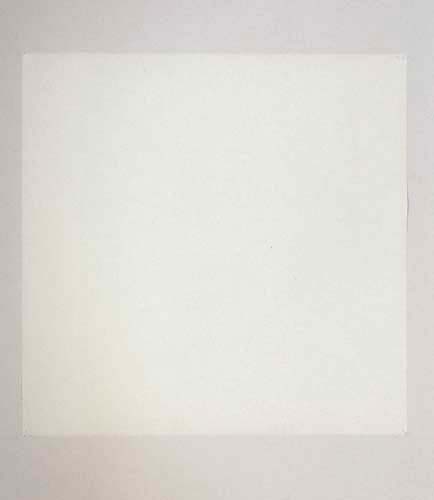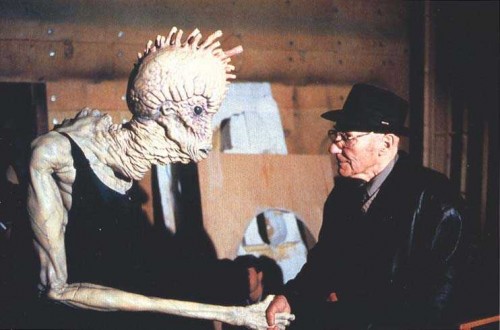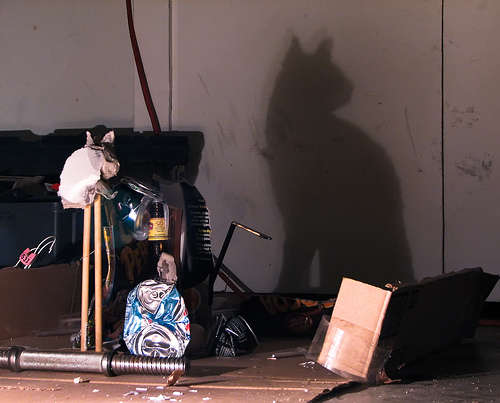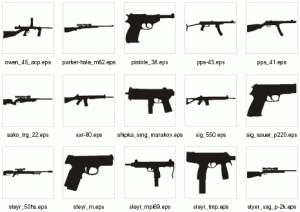1,000 Hours of Staring

Tom Friedman, "1,000 Hours of Staring," Stare on paper (1992-97)
The Ipod as Writing Tool (Don’t Worry This is a “Clean” Post)

My Ipod’s become an instrumental (ha ha) part of my writing.
Charles Simic said something like “Chance is the key that gets me out of the prison of myself. Well, then in this way and in others also, my Ipod’s a key.
First, I use it to generate poems. I record bits and pieces and save the files on to my Ipod, organizing them into appropriate playlist. Bits of the news, pieces from magazines. Bits of fiction and pieces of poetry. Things I’ve heard people say. Descriptions of landscape. Whatever. Etc. Then using the Ipod’s shuffle feature I generate 10-12 piece units (the number can and does of course vary). This is a starting point block of text that I then manually edit on the page.
I also use my Ipod for editing pieces that I think are done or close to. I record these pieces and put them on a playlist. Then (in bed or walking around or using the bathroom–damn, this was supposed to be “clean”–etc etc) I listen to them and make the edits in my head.
When I’m stuck manually revising and need a bit of color for example (like Jean Follain said) I’ll use the Ipod’s shuffle to generate me plenty of word/phrase/image options from which to choose. And then I’ll play around with those “colors” and see if I can make something work.
Of course I also use the Ipod to listen to music while writing or revising.
And the Ipod’s also useful when I’m organizing a book or chapbook. I put the poems (pieces) in a playlist and then using the Shuffle I get these strange and sometimes useful sequences that I would have trouble coming up with on my own. And, in the end, I sometimes use some of these orderings the machine creates. At the very least it’s amusing.
I’m wondering who else may be using the Ipod in similar ways. Or differently?
And I’m also interested in knowing what other methods of chance composition you guys (and gals) may be using to lead you out of the prison (or into the labyrinth) of the self.
(Simic I think just used to randomly take books off the shelf and open them to random pages. And sometimes did this with James Tate. Perhaps in the nude, with pastries. Perhaps.
Damn, this was going to be “clean”!!!)
Literature’s Material Circumstances
 Blake already posted about &Now, but I want to put up more about one panel titled “Writing’s Dirty Secret: An Investigation of Literature’s Material Circumstances.” This panel was run by Jeremy Davies and AD Jameson and was really interesting because it tried to get at some of the more process-based questions about writing habits. How do we write? What do we use to write? Time of day? And so on. Standard questions really, but questions that might not get the focused treatment they deserve.
Blake already posted about &Now, but I want to put up more about one panel titled “Writing’s Dirty Secret: An Investigation of Literature’s Material Circumstances.” This panel was run by Jeremy Davies and AD Jameson and was really interesting because it tried to get at some of the more process-based questions about writing habits. How do we write? What do we use to write? Time of day? And so on. Standard questions really, but questions that might not get the focused treatment they deserve.
The panel led to more discussion between Matt Kirkpatrick, Lily Hoang, and myself later that night. Lily echoed a remark that panelist Vanessa Place made: that to answer these kind of questions was somewhat frustrating because of how predictable our answers are, as the questions and our answers are so bound up in what we think a writer ought to say when asked “how do you write?” Place asked during the panel something like this: how many of our writing habits come not from what works best for us but what we think ought to work best for us based on some idealized notion we have about what it means to be a ‘writer’?
what is the relationship between your work and theory?
So yesterday I was doing some research to find out if anything has been written on the intersection of Deleuzian studies & Finnegans Wake. (Turns out, not much!) Anyway, I came across this public dialog between Jean-Michel Rabaté and Gregg Lambert called “The Future of Theory?” from 2002, occasioned by the publication of Rabaté’s book The Future of Theory.
Among other things, it got me thinking about the relationship between theory and creative writing. Do contemporary creative writers read theory, think about theory, use theory in their creative work? If so, how?

As an added bonus, here’s the intro to their conversation:
Lambert: To begin with I want to recall a line from Difference and Repetition, which forecasts a style of philosophy for the future, regarding what Deleuze describes as “a bearded Mona Lisa and a clean shaven Marx.” This line returned to me, Jean-Michel, as I read your account in The Future of Theory, particularly regarding your description of what you call “an hysterical Hegel.” Now, I always thought Marx was the hysterical one in relationship with Hegel, but here you seem to be saying something different. In the book there is a very dominant thesis that that Theory constantly risks becoming a little bit hysterical, or that its discourse itself is, in some way, hystericizing. Can you talk a bit about your use of the term “hysterical” with regard to the discourse of theory?
You can listen to the whole conversation here.
Edge
 Some writers (like me) need to be on edge to write and sometimes life just naturally gets ya so with weddings, funerals, fiery and rainy days. But sometimes you need to get yourself an edge. Manufacture it.
Some writers (like me) need to be on edge to write and sometimes life just naturally gets ya so with weddings, funerals, fiery and rainy days. But sometimes you need to get yourself an edge. Manufacture it.
–Porn, music, drugs, exercise, sleep-deprivation, medication, meditation, masturbation, punching a wall, self mutilation, punching a dummy, travel, unsafe sex, hunting, gambling, binge eating, purging, murder, torture, puzzles.
who of yall needs this “edge” and what do y’all do to set yourself thusly? (just wondering on an early sunday morning in D.C. — was at the Mall last night and feeling quite patriotic. a bit edgy, actually,…..)
Creative Writing 101

Tuesday, 10/13. Shredded Text Day.
For Tuesday we read a few brief excerpts from Naked Lunch (Dr. Benway’s “aesthetic surgery,” and “have you seen Pantopon rose”) plus four selections from Gentle Reader! a collaborative book of poetry written by Joshua Beckman, Anthony McCann and Matthew Rohrer. If you’ve never heard of this book, it’s because it was privately (or, if you want to be a dick about it, self-) published by the three poets, and hence is not generally available. (I cadged a copy from Rohrer.) The poems are not written collaboratively–I don’t think–but they’re all unsigned, so you have to guess who wrote what. Also, each poem is an erasure of a Romantic-era text. There’s a key at the back. Since I don’t have the materials ready-to-hand (I’m posting this from a writers’ retreat in Breckenridge, CO, where I’m serving as writer-in-residence for the weekend) I can’t tell you much about the poems, other than that the one called “I Was Alive” is an erasure of Frankenstein, and that it was written by Anthony McCann–both of which things I know because McCann first published the poem non-anonymously in the Agriculture Reader.
Anyway, we didn’t do a lot of textual analysis, and so you won’t be getting the usual slate of close readings. I was more interested in presenting a variety of non-narrative forms, and in talking about the technical aspects of the processes used to create the works. Then we busted out the scissors, Sharpies, and photocopies, and got down to the good work of fucking shit up.
Waiting for Gato

cat shadow sculpture
Instructions on writing a piece called “Waiting for Gato.”
1. Google an excerpt from Waiting for Godot
2. Using ‘find and replace’ MS function replace “Godot” with “Cat.”
3. Use online translator to translate from English into Spanish.
4. Replace non-verbal sounds with “meow.”
Meta Context
I love John Rutter. His Requiem is my favorite of all Requiems. You should check it out.
But here is another piece of his, “All Things Bright and Beautiful,” which I also find exquisite. But what strikes me as most interesting now is that, just by posting this here, I’m making the video scary. The question is: what about this do I think is appropriate for this site? There isn’t an answer, but if you watch the video looking for one, I expect you’ll have some dark thoughts. Or funny thoughts.
Or maybe I’m completely wrong. I’d be interested to know.
Creative Writing 101

(for previous installments in this series, click here)
WORK DISCUSSED THIS WEEK: “Ancestral Legacies,” “On the Subject of Fiction Based on Non-Ficton,” and “The Gun Lobby” – all by Jim Shepard.
My goal for this week was to give the class another sense of the scope of writerly possibility. This time, instead of pairing different mediums of writing or organizing some little squad of unrelated writers together around a common theme, I chose to showcase two very different works of fiction by the same writer. “Ancestral Legacies” is historical fiction, and follows two Nazis on a pseudo-scientific mission to Tibet. (Himmler has ordered them to trace the path of a legendary Aryan ur-language; believing Himmler’s claims to be nonsensical, but their own to be legitimate, they’ve taken his funding and are using it to conduct their own research into the existence of the yeti.) “The Gun Lobby” is about a suburban marriage falling apart–the wife has taken the husband hostage in their home.
The biggest surprise came first– large factions of the class didn’t like “Ancestral Legacies.” They thought it moved too slowly, and was “boring.” I couldn’t believe this. Nazis! Tibet! Yeti! And they were “bored…”

 George Carlin has
George Carlin has